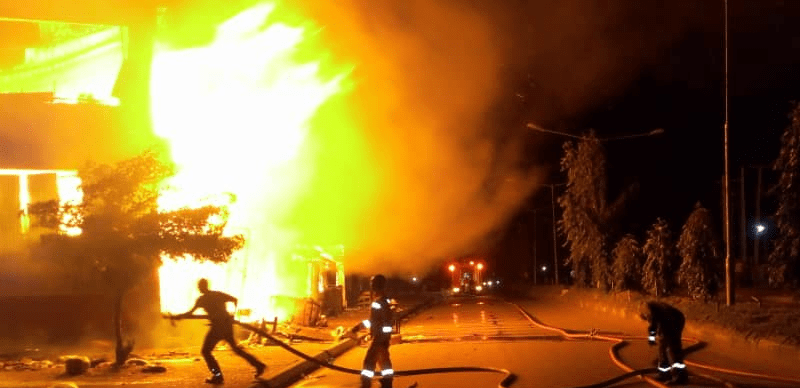National Issues
Jigawa’s Fiery Tragedy -By Ike Willie-Nwobu
The tragedy in Jigawa should serve as an eye-opener. But before another boat mishap, or building collapse or tanker explosion, Nigeria must resolve and react in a manner that shows that it will no longer tolerate these avoidable tragedies.

Nigeria’s season of accidents has continued with the harvest of deaths bringing about a rapidly growing pile of corpses.
Weeks after a boat packed full of people sank in the Gbajibo river in Niger State, dragging more than 100 people to their deaths by drowning, a fire outbreak in a lounge and bar in Lagos State burnt four hotel staff beyond recognition before the police could arrive on October 8.
The death ship has since moved to Jigawa State where it recently claimed about 167 people. According to reports, on October 15, a tanker exploded in Majiya, Jigawa State, killing at least 170 people, leaving about 70 others with varying degrees of injury. Many of the victims were caught by explosions as they scooped fuel from the tanker.
The tragedy which has thrown a country already in jeopardy into more misery and sorrow is simply imponderable. Its far-reaching implications mean that for a very long time, the community, the state, and Nigeria as a whole will be counting losses.
The country may still be mourning, but in the face of these recurring accidents which is extracting an incalculable toll from Nigeria and Nigerians, there is no better time to question the government as well as Nigerians about how seriously they take issues of personal and public safety.
Where exactly do Nigerians and their government stand on the issues of personal and public safety? Experience shows that it is when personal safety is given high priority that an invulnerable bubble of public safety is built.
What does safety to the everyday Nigerian who refuses to use their seatbelt while driving or as a passenger in a vehicle? How about those who deliberately or drunkenly drive recklessly on roads riddled with death traps, while ever ready to reel out their years of driving as a rapid defence against those who would call out their suicidal folly, with their thousand years of driving to silence those who caution.
How serious about safety is the person who dumps trash into water channels, knowing that clogged water channels during heavy rainfall could bring about catastrophic flooding?
In the days when Covid-19 bit hard, many Nigerians, encouraged by some defiant but ignorant state governors, refused to observe safety measures and protocols, endangering themselves and others.
How many Nigerians do everything possible to stay safe? How many wait for the government which is customarily reactionary to do for them what they cannot do for themselves?
What were people doing scooping fuel from the tanker when they knew that the likelihood of devastating explosions was very high?
In their bid to survive, to beat the odds, to outfox the adversities stacked against them, how much are Nigerians prepared to cheat death and how many times do they succeed.
Experience shows that Nigerians do not learn from experience and that, just like the government, they don’t take treat issues of safety with the seriousness it deserves.
Usually, it is until a tragedy occurs that measures are taken.
The most dangerous thing about breaches of personal and public safety protocols is that there is often no time left for the primary parties to learn lessons. Death, which characteristically arrives with finality in such situations typically leaves those directly involved dead and cold, long before they are able to glean any lessons from their mistakes.
The government in Nigeria must do more at all levels to drive home the imperative of personal and public safety. Nigerians should be constantly educated and re-educated on the dangers of their recklessness.
Beyond education, there must be severe sanctions for defaulters who in their stupidity endanger not only themselves but others. In this wise, government inspectors must do more while shunning the kickbacks offered them to shirk their responsibilities.
Safety protocols must always be enforced and insisted upon. While it is true that accidents happen, the regularity in Nigeria is frankly disturbing.
These tragedies which are evenly spread over the country also show that many people do not value their lives enough. The risks they often take to show their disregard for themselves and others rather than any calculation on their part.
Many of them feel that they have no part to play in their safety, while others feel that they may as well do as they wish since death is everyone’s final destination at the end of the day.
There are others still who cling on to superstition and religion to argue that it is not their responsibility to be safe.
The tragedy in Jigawa should serve as an eye-opener. But before another boat mishap, or building collapse or tanker explosion, Nigeria must resolve and react in a manner that shows that it will no longer tolerate these avoidable tragedies.
Ike Willie-Nwobu,









